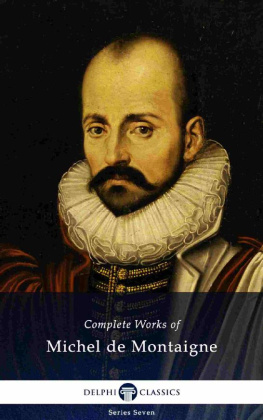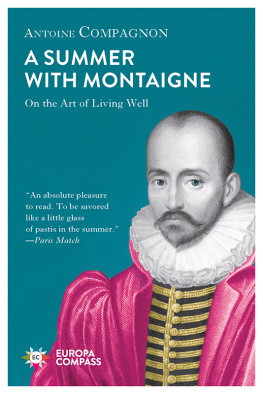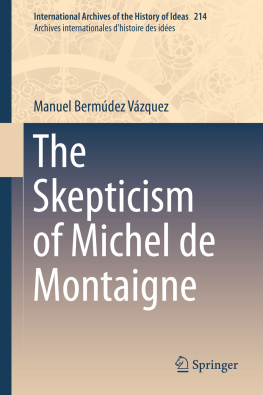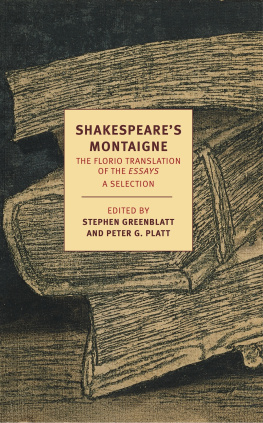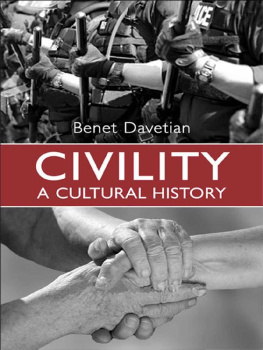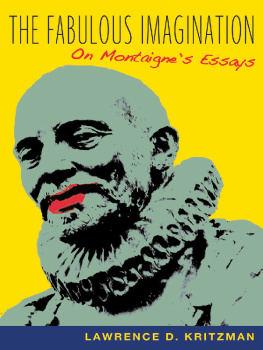Landmarks
Page-list
WHAT HAPPENED TO CIVILITY
What Happened to
CIVILITY
THE PROMISE AND FAILURE OF
MONTAIGNES MODERN PROJECT
ANN HARTLE
University of Notre Dame Press
Notre Dame, Indiana
Copyright 2022 by University of Notre Dame
Published by the University of Notre Dame Press
Notre Dame, Indiana 46556
undpress.nd.edu
All Rights Reserved
Published in the United States of America
Library of Congress Control Number: 2021948628
ISBN: 978-0-268-20232-3 (Hardback)
ISBN: 978-0-268-20233-0 (Paperback)
ISBN: 978-0-268-20234-7 (WebPDF)
ISBN: 978-0-268-20231-6 (Epub)
This e-Book was converted from the original source file by a third-party vendor. Readers who notice any formatting, textual, or readability issues are encouraged to contact the publisher at
For Robert and Shannon
CONTENTS
ACKNOWLEDGMENTS
I wish to express my gratitude to Francis Slade, whose understanding of the origins of modern philosophy has shaped my own views and whose work is foundational for this book. My thanks are due to John Kekes, who read an earlier version of this book and gave me many very helpful suggestions. The two reviewers for the press helped me to clarify and sharpen my argument. Margaret Matthews assisted me with the research on Montaigne. I am grateful for that assistance as well as additional forms of support funded by the Heilbrun Distinguished Emeritus Fellowship through the Emory University Emeritus College. An NEH Fundamental Questions grant funded a freshman seminar on civility that I designed and taught in 2014. The seminar was the occasion for developing my interest in this topic.
INTRODUCTION
The human condition in our postmodern, post-Christian, Western world is a condition of both unprecedented individual freedom and deep cultural division. The freedom of the self-creating individual from nature and from tradition extends even to the choice of ones gender, while the norms of individual choice are so radically opposed that it is no longer possible to speak to each other in the terms of a common culture. Instead of having a common culture grounded in a shared tradition, we are increasingly divided between two cultures at war with each other: a culture of those who regard themselves as elite self-creating individuals not bound by the norms of tradition and the culture of those who do regard themselves as bound by traditional norms, which they believe society should foster. Civility is supposed to be the bond that holds us together in peace and mutual respect. However, with the deepening of cultural differences, civility has deteriorated alarmingly.
My purpose is to gain clarity about our present condition and to understand how we arrived at this point where civility seems impossible. What is civility and why has it disappeared?
The idea of civility has a long history going back as far as ancient Rome, and it admits of a wide range of meanings from simple courtesy to what it means to be civilized in terms of education in the entire culture of a civilization. Civility, as I discuss it here, is the social bond that makes it possible for individuals to live in peace in the political and social structures of the modern Western world. When we say today that civility has failed, I take it that that is what we mean by civility.
Civility, of course, cannot account for every aspect of human life in the modern world. Ideas such as human rights, sovereignty, representative government, and the general will have all shaped the structures of our political life. Civility as I present it here and as I believe Montaigne understood it pertains specifically to social interactions. Society (as I discuss it in chapter 2) is the counterpart of the modern state: a society can be civil to the extent that it is free of the coercive power of the state. Civility is the character that is indispensable for individuals to live in and enjoy the human interactions of a free society.
Civility, then, is not simply good manners and courtesy. It is a complete moral character, including many qualities that we think of today as virtues but that, although they were present to one degree or another, were not considered virtues in the premodern world. These qualities or dispositions are promise keeping, generosity, compassion, forgiveness, trust, toleration, openness, sincerity, self-disclosure, and similar qualities that might be called social virtues. Civility is supposed to replace the traditional moral virtues as the social bond. When we say that civility has failed, we mean that these qualities are in danger of disappearing and that the social bond is disintegrating.
How and when does this modern notion of civility come on the scene? As Teresa Bejan demonstrates, this concept of civility arose in early modern attempts to refasten the social bonds severed by the Reformation. The Reformation destroyed the unity of Christendom, rejecting the authority of tradition in favor of the authority of Scripture alone. At that point, civility comes into existence to replace the tradition as the social bond.
According to Michael Oakeshott, early modern European history was a moment when the civil character became visible and received its classic expression in the Essays of Montaigne. To say that Montaigne invented civility is to say that he saw, in the ruins of the tradition, the possibility of a new social bond and that he formed the new civil character out of the fragments of the tradition. He uses historical examples and fragments of ancient philosophy to give expression, in familiar terms, to the new order that he brings into being. He puts the past into the service of his own new philosophical project.
Montaigne constructs this civil character out of the fragments of the shattered classical-Christian traditionin particular, from classical magnanimity and Christian charity. Montaigne often presents himself as a third type, a transformation of and alternative to both classical and Christian types. For example, as Pierre Manent argues, Montaigne transforms classical magnanimity by renouncing honor, and he transforms Christian humility by confessing not his sins but his mere human weakness. And, as I attempt to show, the centrality of compassion in modern moral discourse has its source in Christian charity.
To say that civility is a philosophical invention does not mean that only the philosopher can be civil or that all must become philosophers in order to be civil. Rather, Montaigne displays this character in the Essays as a new possibility for human being. My claim is that the Essays are the first act of self-conscious civility. Philosophy, as he engages in it, makes his civility self-conscious. But for most people, civility is not, cannot, and should not be self-conscious in this philosophical sense, because true reformation must take place at the level of unreflective mores and prereflective sensibilities.
The Essays are addressed not only to philosophers but to the great, to the gentlemen of his day who are ready to break with the old standards of nobility. Montaigne writes in order to reform the mores of his culture, a reformation for which he must have thought the culture was prepared. He does not present philosophical arguments to persuade his readers to reform themselves: that is why the Essays do not look like philosophy. Rather, he presents himself as an example or type of a new moral character, and the success of the Essays shows that this character was indeed an attractive possibility to his contemporaries. As David Quint argues in Montaigne and the Quality of Mercy, Montaignes intention is the transformation of the mores of the nobility through the replacement of valor by mercy and compassion as the standard of noble action. The revaluations that occur throughout the



